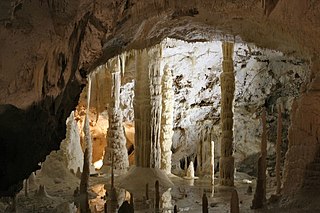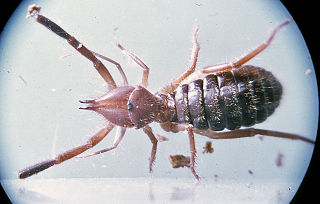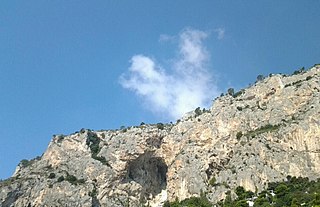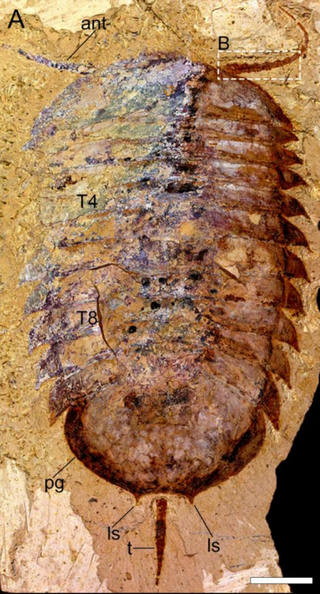Aysheaia is an extinct genus of soft-bodied lobopod, known from the middle Cambrian of North America, with an average body length of 1–6 cm.

Solifugae is an order of animals in the class Arachnida known variously as camel spiders, wind scorpions, sun spiders, or solifuges. The order includes more than 1,000 described species in about 147 genera. Despite the common names, they are neither true scorpions, nor true spiders. Most species of Solifugae live in dry climates and feed opportunistically on ground-dwelling arthropods and other small animals. The largest species grow to a length of 12–15 cm (5–6 in), including legs. A number of urban legends exaggerate the size and speed of the Solifugae, and their potential danger to humans, which is negligible.

Ammotrechidae is a family of solifuges distributed in the Americas and the Caribbean Islands. It includes 26 described genera and 95 species. Members of this family can be distinguished from members of other families by the absence of claws on tarsi of leg I, tarsal segmentation 1-2-2-(2-4), pedipalps with pairs of lateroventral spines, and by males having an immovable flagellum on the mesal face of each chelicerum. The propeltidium of the Ammotrechidae is recurved.
Carosino is a town and comune in the province of Taranto, in the northern Salento, part of the Apulia region of southeast Italy. Carosino was historically an Arbëreshë settlement.

Facivermis is a genus of sessile lobopodian from the Lower Cambrian Maotianshan shales of China

The Frasassi Caves are a karst cave system in the municipality of Genga, Italy, in the province of Ancona, Marche. They are among the most famous show caves in Italy.

Daesiidae is a family of solifugids, which are widespread in Africa and the Middle East. Members of the family are also present in India, Italy, South America, the Balkans, and the single species Gluvia dorsalis in the Iberian Peninsula. A single fossil species is known from Eocene Baltic amber.

Simonetta Myriam Sommaruga is a Swiss politician who served as a Member of the Swiss Federal Council from 2010 to 2022. A member of the Social Democratic Party (SP/PS), she was President of the Swiss Confederation in 2015 and 2020.

Eremobatidae is a family of solifuges, first described by Karl Kraepelin in 1901.

The Grotta delle Felci is a cave located on the island of Capri, in Campania, Italy.

The Arene Candide, is an archaeological site in Finale Ligure, Liguria, Italy. Its name was derived from the eponymous dune of white (candida) sand (arena) that could be found at the base of the cliff until the 1920s in the Caprazoppa promontory, where the Arene Candide cave is located.
Ammotrechella is a genus of ammotrechid camel spiders, first described by Carl Friedrich Roewer in 1934.

Retifacies is an extinct arthropod, that lived in the lower Cambrian. Its fossil remains have been found in the Maotianshan Shales of Yunnan, China. It is a member of the Artiopoda.

Collinsovermis is a genus of extinct panarthropod belonging to the group Lobopodia and known from the middle Cambrian Burgess Shale in British Columbia, Canada. It is monotypic having only one species, Collinsovermis monstruosus. After its initial discovery in 1983, Desmond H. Collins popularised it as a unique animal and was subsequently dubbed "Collins' monster" for its unusual super armoured body. The formal scientific description and name were given in 2020.
Sedna is a monotypic genus of ammotrechid camel spiders, first described by Martin Hammond Muma in 1971. Its single species, Sedna pirata is distributed in Chile.
Eberlanzia is a genus of daesiid camel spiders, first described by Carl Friedrich Roewer in 1941.
Biton is a genus of daesiid camel spiders, first described by Ferdinand Karsch in 1880.
Gluviopsis is a genus of daesiid camel spiders, first described by Karl Kraepelin in 1899.

Villa Puccini is a cultural site in Torre del Lago, near Viareggio in Tuscany, Italy. It is a museum dedicated to the composer Giacomo Puccini, who lived here from 1900 to 1921.











